Appeals Court Ruling Threatens 100+ Capitol Rioter Sentences
The "interference with the administration of justice" enhancement was wrongly applied.
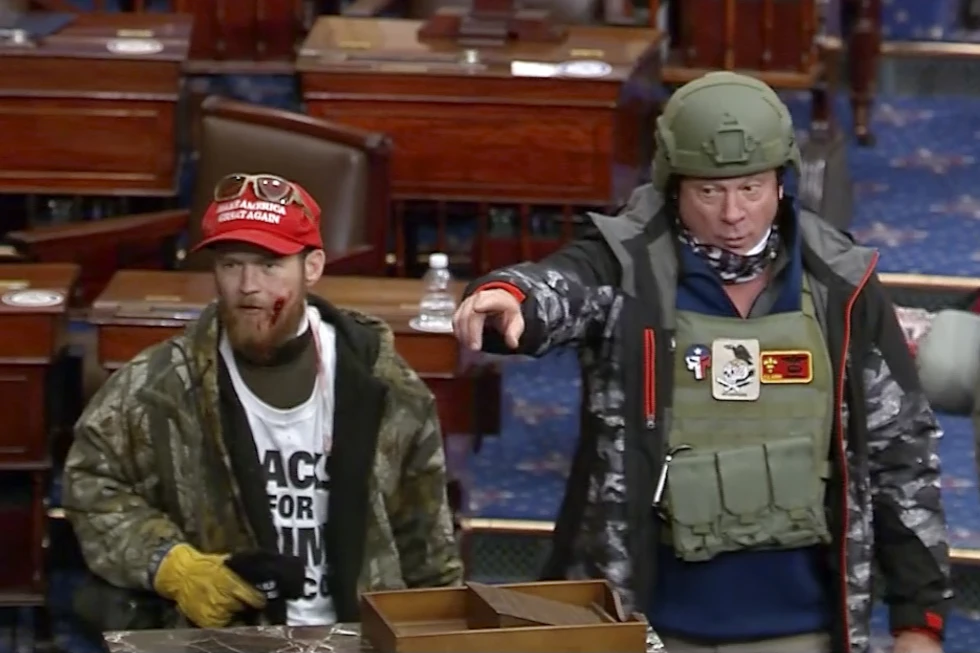
AP (“Appeals court ruling that vacates Capitol rioter’s sentence could impact dozens of Jan. 6 cases“):
A federal appeals court in Washington has ordered a new sentence for a retired Air Force officer who stormed the U.S. Capitol dressed in combat gear, in a ruling issued Friday that could impact dozens of other cases stemming from the Jan. 6, 2021, attack.
While a panel of the U.S. Court of Appeals for the D.C. Circuit upheld Larry Brock’s conviction, the court said a judge wrongly applied an enhancement that lengthened the recommended prison sentence range under federal guidelines.
The enhancement — on the grounds that Brock’s conduct resulted in “substantial interference with the administration of justice” — has been applied in more than 100 other Jan. 6 defendants’ cases, said Patricia Hartman, a spokesperson for the Washington’s U.S. attorney’s office. If the ruling stands, those defendants who have not already completed their prison terms may push for new sentences.
[…]
Brock was sentenced last year to two years in prison after being convicted of a felony charge of obstruction of an official proceeding and misdemeanor offenses. He is currently serving his sentence at a federal lockup in Missouri and is expected to be released in December, according to online Bureau of Prisons records.
[…]
The obstruction felony charge is already at the center of another case the U.S. Supreme Court will hear arguments on next month that could upended hundreds of Capitol riot cases. The justices agreed to hear the appeal filed by lawyers for another rioter charged with obstruction of an official proceeding — one of the most widely used charges brought in the Jan. 6 attack.
In Brock’s case, the appeals court said the “administration of justice” sentencing enhancement applies to judicial proceedings but does not extend to interfering with the certification of the electoral vote. That’s what Congress was meeting to do on Jan. 6 when supporters of Donald Trump stormed the Capitol.
“Brock’s interference with one stage of the Electoral College vote-counting process— while no doubt endangering our democratic processes and temporarily derailing Congress’s constitutional work—did not interfere with the ‘administration of justice,’” the three-judge panel wrote.
It’s unclear to what extent Brock’s — or other defendants’ — punishments might be reduced on re-sentencing. With the sentencing enhancement, the range in Brock’s case under federal guidelines was 24 to 30 months. U.S. District Judge John Bates sentenced Brock to the low end of those guidelines, which merely provide direction for judges when they are considering punishments and are not mandatory.
Brock’s attorney has said in court papers that the misapplied enhancement likely increased his client’s sentence by about nine months. Prosecutors had recommended a sentence of five years in prison.
WaPo (“Appeals court ruling means over 100 Jan. 6 rioters may be resentenced“) adds:
The court, a panel of three Democratic appointees, did not overturn the conviction. But it said that a lower court judge erred in deciding that Brock should face a stiffer sentence for “substantial interference with the administration of justice,” ruling that the penalty does not apply to crimes committed at the Capitol.
At least 100 people convicted in connection with the Jan. 6 attack have had their punishments shaped by that enhancement, and they could now ask to be sentenced anew. That does not mean they would necessarily face lighter terms. Sentencing enhancements raise the suggested range of prison time that a judge must consider. But in D.C., judges have generally imposed penalties below those recommended ranges, and they have often said their punishments would be the same regardless of what enhancements they applied.
Which, from a lay standpoint, makes no sense at all: Why apply a questionable enhancement if doing so doesn’t enhance the sentence?
Resentencing can also be dangerous for defendants. One participant in the riot who succeeded in undoing his 60-day misdemeanor sentence on technical grounds was given another 60 days behind bars by a judge who cited the man’s lack of remorse. (That ruling is now on appeal.)
Which strikes me as vengefulness, not justice. Defendants are entitled to appeal their convictions. Doing so and winning should certainly not be punished.
Still, many will surely ask for lower punishments. Edward Ungvarsky, a defense attorney involved in several Jan. 6 cases, said there is “great potential” for some defendants to win earlier release. “Even if a judge suggested their sentence would be the same regardless of application of any enhancements,” he said, that judge “still has to meaningfully reconsider that sentence.” The ruling could also have an impact in plea negotiations, eliminating a bargaining chip used by prosecutors to encourage defendants to plead guilty without a trial.
Again, from a lay standpoint, one would think that a judge, ordered to reconsider a sentence by a higher court, decided that, no, his original sentence was right—or, indeed, too lenient—would be in contempt.
Brock, who gained notoriety after he was photographed in the Senate Chamber wearing an army green helmet and vest, was sentenced to two years in prison — far less than prosecutors sought, and at the bottom of his guidelines. He is scheduled to be released in December.
Now, in the particular case of Brock, sentencing at the bottom of the guidelines strikes me as odd for reasons that will soon be clear.
Those guidelines included an extra penalty for “substantial interference with the administration of justice.” Judge John D. Bates reasoned, as several other trial judges have, that it applied because Brock “contributed to this unnecessary expenditure of substantial government resources during and after the riot.” The appeals court, however, ruled that “text, context, and commentary” indicate that “justice” covers only “investigative, prosecutorial, or judicial resources.”
They added, “We must apply the Guideline as written, and Brock’s interference with one stage of the electoral college vote-counting process — while no doubt endangering our democratic processes and temporarily derailing Congress’s constitutional work — did not interfere with the ‘administration of justice.’”
The ruling is based on a relatively obscure statute passed in the wake of the Enron scandal. While the initial decision that Capitol rioters could be punished under it strikes me as a perfectly good faith interpretation, I have no reason to think three Democratic judges who clearly found the defendants’ actions as outrageous are doing anything other than a good faith reading.
The decision comes as the D.C. courts brace for a ruling that could be far more disruptive to the Jan. 6 docket, which involves over 1,300 cases. On April 16, the Supreme Court will consider whether the crime of “obstruction of an official proceeding” includes blocking Congress from certifying the 2020 election results — the same charge Brock challenged that resulted in the panel’s decision on his sentencing.
The appellate court had already ruled in an earlier Jan. 6 case that “obstructing an official proceeding” does not apply only to destroying evidence, as many riot defendants have claimed. Even though the crime was created in response to attempts to cover up a financial scandal, the court said, stopping Congress from certifying a presidential election also qualifies.
A reversal of how the government has been applying the obstruction charge would affect more than 340 prosecutions — including the special counsel case against Trump in D.C. The former president and Republican front-runner is charged with both obstructing and conspiring to obstruct Congress, along with two other felonies.
Convicted rioters have also challenged the law by questioning whether prosecutors had proved they understood their conduct was unlawful and wrong. Brock and other defendants argued that they believed they were doing the right thing in blocking the vote count, and thus had no “consciousness of wrongdoing.” In 2005, the U.S. Supreme Court overturned the guilty verdict against Enron accounting firm Arthur Andersen, whose role in the Enron scandal inspired the obstruction law, because jurors were not properly instructed on that point.
That successful defense was seen as a loophole in the law which Congress fixed. It’s that statute being applied here. But the notion Brock thought his actions were legal is laughable on its face.
The D.C. Circuit previously held that if a rioter committed another felony while obstructing Congress, such as carrying a dangerous weapon, that showed awareness of wrongdoing. Brock did not engage in violence and was convicted of no other felonious conduct. But in upholding his conviction Friday, the court said other evidence could be used to show unlawful intent, including social media posts.
Brock had advocated for “insurrection” online in advance of Jan. 6, saying “the battle isn’t winnable democratically,” evidence cited by the judges. His “plan of attack” was to “seize” government officials who opposed Trump, then “begin interrogations using measures we used on al-Qaida.” He advised, “Do not kill law enforcement officers unless necessary,” and anticipated a “pardon for all crimes up to and including murder.”
“Brock participated in a riot that sought to overturn the 2020 presidential election by force, and … he was himself prepared to take violent action to achieve that goal,” the court said. “Where a defendant announces his intent to use violence to obstruct a congressional proceeding, comes equipped for violence, and then actually obstructs that proceeding, the evidence supports a finding that he acted with an impermissible purpose or knowledge of the wrongfulness of his actions.”
Now, even allowing that people talk tough from the safety of the Internet and that Brock might well not have actually been prepared to kill anyone, he clearly knew that the actions contemplated were crimes. He simply expected that the group would be successful in stealing the election and felt confident that President Trump would have pardoned the participants. And he likely would have.
Brock’s case is especially infuriating because he should damn well have known better. A January 2021 report by Ronan Farrow for The New Yorker describes him as
a fifty-three-year-old father of three who lives in an affluent suburb of Dallas, graduated from the Air Force Academy in 1989, with a major in international relations and affairs. In a LinkedIn profile that Brock recently deleted, he described himself as having served as a chief operations inspector and flight commander with the 706th Fighter Squadron, at one point leading more than two dozen pilots. Brock told me that he served in Afghanistan and, in a non-combat capacity, in Iraq, and that for his service he received three Meritorious Service Medals, six Air Medals, and three Aerial Achievement Medals.
So, this guy took an oath to the Constitution half a dozen times,* has a social science degree from a service academy, and spent a quarter century in the Air Force and Air Force Reserve before retiring in 2014. Apparently, he had become “increasingly radicalized” in the years leading up to the riots.
_____________
*He would have taken an oath upon entry into the Academy, another upon commissioning as a Second Lieutenant, and reaffirmed it at each of his four subsequent promotions.

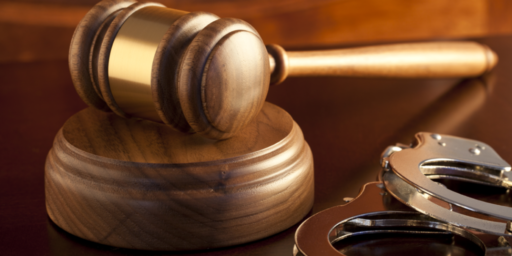

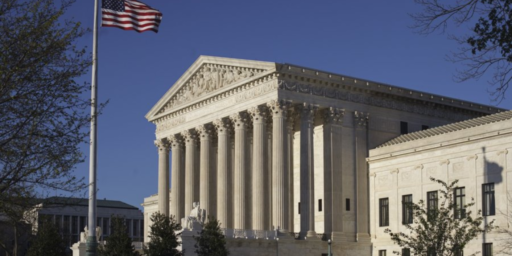
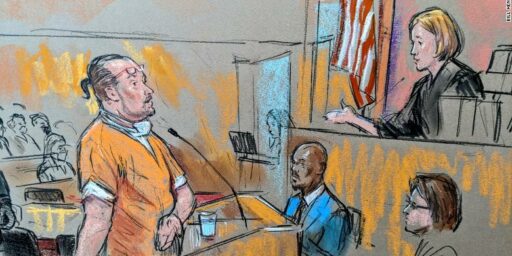
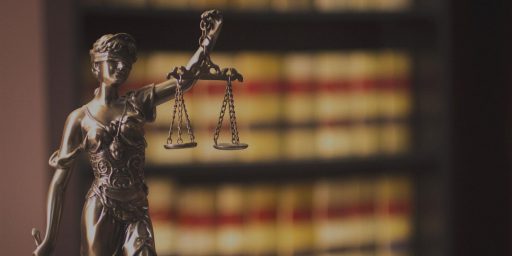
It’s no longer honestly deniable that ‘The System’ is OK with the insurrection.
@Barry: The application of legal standards is rule of law, in contrast with political revenge and score settling, and has nothing to do with a system being okay with insurrection. The decision is a technical one (right or wrong, it is technical and not approving of the actions).
Yes, just more evidence that our justice system is now wholly partisan and biased. Who is actually paying for all of this “legal process” anyway? I swear with enough money on one is ever heald accountable.
@Barry: @Rick DeMent: This was a 3-judge panel, all Democrat-appointed, on the DC Circuit. I don’t think it’s a partisan decision or one “okay with insurrection.”
@Barry:
This is a far more widespread problem, going back a far longer time. The thing is, the system is not set to deal with insurrection. Penalties, when applied, are too mild given the scope of the damage intended.
Numerous times people jailed for insurrection eventually attempt it again, often through more legal means, and often succeed. The nazis in Germany, Chavez in Venezuela, Lenin in Russia, hell even Caesar in Rome (of sorts).
@Kathy:
If we didn’t know it then, and how could we have known , we certainly know it now.
It really is turning out to be that, January 6th 2021 was a dry run. They came very close to succeeding the first time around. Here they are again.
Most of the legal experts who have been following thought it was pretty likely this would happen. The statute in question was intended to be used for more “white collar” crimes (the behavior that Enron execs engaged in). This was always something of a stretch.
The issue at play in that case was a bit arcane. The conviction itself wasn’t overturned. The issue was that there was an issue with the sentencing. The Judge applied two different options when it was found he could only apply one or the other. So he doubled down on the one.
Whether or not it’s fair is a different option. It sounds like the defendant in question was being a bit of an a-hole outside of the court, and so he might have gotten hit with a PITA (Pain in the Ass) tax. Not trying to justify that decision–just contextualize that it’s pretty common in the Criminal Legal System. You are free to choose to piss off a judge, but you shouldn’t expect good results for you on discretionary issues after doing that.
@mattbernius:
I’m sure that the lawyers in the group will confirm these truths I learned while the lawyers’ junior assistant spear carrier:
1. Never piss off (or on) the judicial assistants.
2. Never ever ever piss off (or on) the judge.
Never ends well.
@Rick DeMent:
Indeed. As someone or other observed, the system guarantees as much process as a defendant can afford. And these defendants seem to have a lot of money. It’d be interesting to know where from. Conservative legal entrepreneurship has become a major industry, and major threat to the Republic. And Trump has a lot more money.
@James Joyner:
Well, you got me there, but again, who is paying for all the legal process? These people are doing it on their own dime.
Assuming a fact not in evidence?
Amazing they made it to trial in the first place, in a country where cops execute people in the streets for resisting arrest or having a mental health episode of selling cigarellos or using counterfeit money or owning a gun while black etc.
If people with brown skin had done Jan. 6, they’d have all been mowed down in a hail of bullets, and the men beind the guns cheered nationwide for thwarting a terror attack. Good thing the J6 “insurrectionists” are Trump supporters, so they could be afforded due process.
@DK: I keep hearing this but it’s just not true. How many BLM protestors were gunned down by federal cops?
EDITED TO ADD: I found an August 2021 AP report headlined “Records rebut claims of unequal treatment of Jan. 6 rioters.”